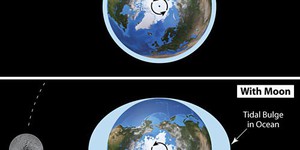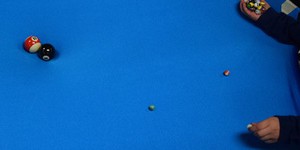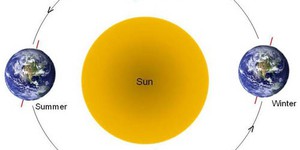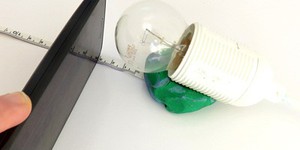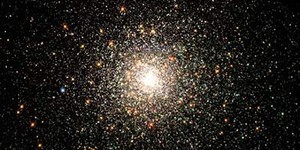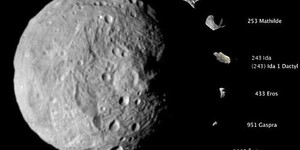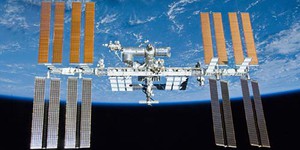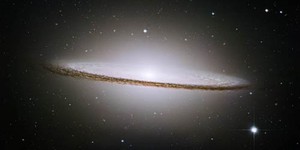Sixth Grade, Astronomy Science Projects (15 results)
Astronomy is science that will challenge your imagination. How many stars in a galaxy? How many galaxies in the known universe? How many strange worlds are out there on other planets, orbiting other stars, and what are they like? Is there life on planets besides Earth? The distances are mind-boggling; the numbers are immense.
|
Select a resource
Sort by
|
Have you ever wondered what causes the tides in Earth's oceans? In this astronomy project, you will discover the answer for yourself! You will investigate how the Sun and Moon control tides in Earth's oceans.
Read more
Featured
Have you heard that garlic powder is supposed to inhibit the growth of bacteria? Which do you think would make a better disinfectant: a solution of garlic powder or a solution of bleach? This project shows you a straightforward way to compare the effectiveness of different disinfectants (or other antimicrobial agents), by measuring zones of inhibition on a culture plate.
Read more
Why do the planets orbit the sun without flying off into space? Do they move in perfect circles or do their orbits take a different shape? And how could you possibly do a science project about any of this—you can't do an experiment with the planets! However, you can build a model of our solar system that demonstrates the concept of gravity, using balls of different sizes to represent the sun and planets. Watch this video for an excellent introduction to the model:
Think…
Read more
New
Drones are small, fast, and maneuverable - this can make them very hard to knock down! Check out this Mark Rober video where he explores both how professional defense companies and some backyard YouTube engineers tackle the problem of knocking drones out of the sky. Can you take this engineering challenge on yourself? What methods can you devise to take down a drone? Which one works the best?
Drones can be expensive, and you probably do not want to risk damaging a $1,000 drone for your science…
Read more
Do you live someplace where you get to experience the full glory of all four seasons? If so, you know well the heady blossoms and dramatic skies of spring; the long, sun-drenched days of summer; the trees shaking in crimson and gold in fall; and the sparkling, brittle snows of winter. But you might not know why we have these seasons, over and over again, in a cycle as predictable as the rising and setting of the Sun. The reasons for the seasons are surprising and have to do with Earth's tilt…
Read more
Have you ever looked up at the stars at night and wondered how fast they were moving or how far away they were? By studying how the brightness of a star changes with distance, you can answer those questions. In this astronomy science project, you'll create a model of starlight and use a sensor app with your smartphone to discover the key relationship between brightness and distance.
Read more
Would it surprise you to learn that no one knows the exact age of the universe? Astronomers have estimates, and as they gather increasingly precise data and measurements, they continue to refine those estimates to come up with more accurate estimates. In this project, you can look at data about stars in dense groups called globular clusters and come up with your own estimate for the minimum age of the universe. How closely will your estimate match those of other astronomers?
Read more
New
Remembering to take medicine at the right time can be hard, especially if you need to take multiple medications at different times of day. It might not be a big deal if you forget to take your daily multivitamin, but for some people, forgetting to take medication at the right time can be dangerous. What if you had a device that could not only set off an alarm at the right time, but also automatically dispense the right pills for you? In this project, you will build an automatic medicine…
Read more
You can measure the diameter of the Sun (and Moon) with a pinhole and a ruler! All you need to know is some simple geometry and the average distance between the Earth and Sun (or Moon). An easy way to make a pinhole is to cut a square hole (2-3 cm across) in the center of a piece of cardboard. Carefully tape a piece of aluminum foil flat over the hole. Use a sharp pin or needle to poke a tiny hole in the center of the foil. Use the pinhole to project an image of the Sun onto a wall or piece…
Read more
Space exploration, living, and working in space exposes space travelers and their equipment to radiation not present on Earth. The study of how we can protect ourselves and our equipment is an essential part of space exploration. Although you will not be able to test at levels equivalent to what you might encounter in space, you can test with lower and safer levels of radiation in the lab or at your home.
There are many types of radiation. This project concentrates on ionizing radiation, or…
Read more
You've heard of gold mining and coal mining, but think outside the box...or the planet...what about asteroid mining? Scientists, engineers, and business people believe asteroid mining is feasible, and they are in the beginning stages of long-term plans to mine asteroids for valuable resources during space missions. You don't want to miss out on all the fun; in this science project, you will come up with your own scientific plan for an asteroid mining company. We will help get you started by…
Read more
The movement of satellites is intriguing, but how do they orbit the way they do? Aerospace engineers run calculations and set up computer models to help them predict how satellites move in space, but in this astronomy science project, you will create a physical model with marbles, clay, and a cookie sheet to help you study how satellites move in space and learn from your observations.
Read more
The Milky Way is the edgewise view of our home galaxy, a disk made up of billions of stars. The Sun resides on one of the spiral arms of the disk, 30,000 light-years from the thick hub of the galaxy. The actual center, with a black hole 3-4 million times the Sun's mass, is hidden by dust clouds in space. In this astronomy science fair project, you will use astronomical data to locate the center of this galaxy.
Read more
|
Explore Our Science Videos
DIY Mini LED Lightsaber
Light-Tracking Robot: BlueBot Project #2
Is the Egg Raw or Cooked? STEM activity

